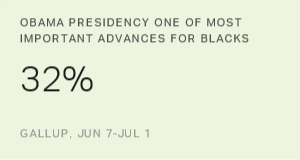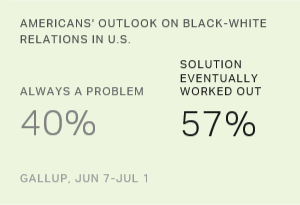Story Highlights
- 32% say Obama's presidency one of most important advances for blacks
- Down from 71% after his election, 58% in first year in office
- More say race relations have gotten worse than better
PRINCETON, N.J. -- Americans are far less positive today about what Barack Obama's presidency means for the advancement of blacks in the U.S. than they were shortly after his historic election. Currently, 32% say Obama's presidency is one of the most important advances for blacks in the past 100 years, down from 71% immediately after he was elected and 58% nine months into his first term. Today, nearly as many describe it as "not that important" as say it is one of the most important advances for blacks.
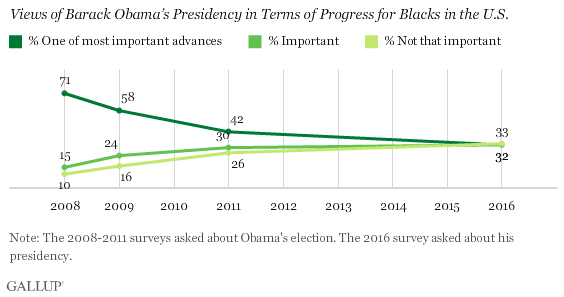
The decline in perceived significance of Obama's election and presidency is evident among both blacks and whites, though blacks remain more positive overall. In October 2009, 71% of blacks considered Obama's election as one of the most important advances for blacks; today, 51% do. Among whites, the percentage has declined from 56% to 27%.
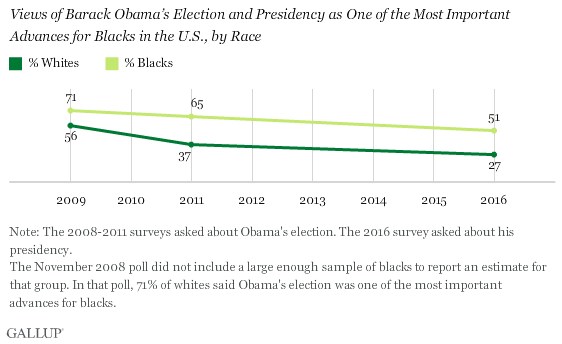
These results are based on Gallup's 2016 Minority Rights and Relations poll, conducted June 7-July 1, just before a renewed round of deadly racial incidents between police and black men in early July. Gallup interviewed 3,270 U.S. adults, including 1,320 non-Hispanic whites and 912 non-Hispanic blacks.
Americans' optimism about the effects that Obama's election and presidency would have on race relations has also declined significantly since he was elected in November 2008. At that time, 70% of Americans expected race relations in the U.S. to get better, while only 10% believed relations would get worse. Now, more say that race relations have gotten worse as a result of his presidency (46%) than say they have gotten better (29%).
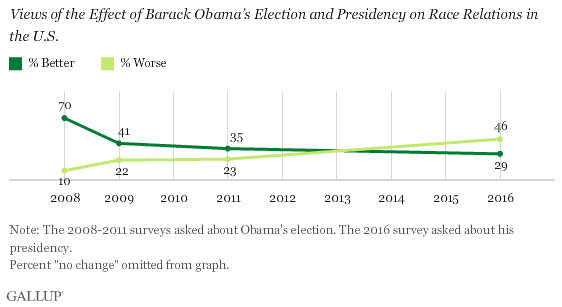
Whites, by more than a 2-to-1 margin, now say race relations are worse rather than better. Blacks are more charitable in their evaluation of the effect of Obama's presidency on U.S. race relations, but they are divided on whether things are better or worse. Both blacks' and whites' opinions are more pessimistic than they were in October 2009, nine months into Obama's presidency.
| 2009 | 2011 | 2016 | ||||||||||||||||||||||||||||||||||||||||||||||||||||||||||||||||||||||||||||||||||||||||||||||||||
|---|---|---|---|---|---|---|---|---|---|---|---|---|---|---|---|---|---|---|---|---|---|---|---|---|---|---|---|---|---|---|---|---|---|---|---|---|---|---|---|---|---|---|---|---|---|---|---|---|---|---|---|---|---|---|---|---|---|---|---|---|---|---|---|---|---|---|---|---|---|---|---|---|---|---|---|---|---|---|---|---|---|---|---|---|---|---|---|---|---|---|---|---|---|---|---|---|---|---|---|---|
| % | % | % | ||||||||||||||||||||||||||||||||||||||||||||||||||||||||||||||||||||||||||||||||||||||||||||||||||
| Whites | ||||||||||||||||||||||||||||||||||||||||||||||||||||||||||||||||||||||||||||||||||||||||||||||||||||
| Better | 39 | 31 | 23 | |||||||||||||||||||||||||||||||||||||||||||||||||||||||||||||||||||||||||||||||||||||||||||||||||
| No change | 36 | 45 | 25 | |||||||||||||||||||||||||||||||||||||||||||||||||||||||||||||||||||||||||||||||||||||||||||||||||
| Worse | 23 | 22 | 51 | |||||||||||||||||||||||||||||||||||||||||||||||||||||||||||||||||||||||||||||||||||||||||||||||||
| NET (Better-Worse) | +16 | +9 | -28 | |||||||||||||||||||||||||||||||||||||||||||||||||||||||||||||||||||||||||||||||||||||||||||||||||
| Blacks | ||||||||||||||||||||||||||||||||||||||||||||||||||||||||||||||||||||||||||||||||||||||||||||||||||||
| Better | 53 | 48 | 37 | |||||||||||||||||||||||||||||||||||||||||||||||||||||||||||||||||||||||||||||||||||||||||||||||||
| No change | 27 | 27 | 24 | |||||||||||||||||||||||||||||||||||||||||||||||||||||||||||||||||||||||||||||||||||||||||||||||||
| Worse | 20 | 24 | 39 | |||||||||||||||||||||||||||||||||||||||||||||||||||||||||||||||||||||||||||||||||||||||||||||||||
| NET (Better-Worse) | +33 | +24 | -2 | |||||||||||||||||||||||||||||||||||||||||||||||||||||||||||||||||||||||||||||||||||||||||||||||||
| 2009-2011 surveys asked about Obama's election; 2016 survey asked about his presidency. Not enough blacks in 2008 poll to report an estimate. | ||||||||||||||||||||||||||||||||||||||||||||||||||||||||||||||||||||||||||||||||||||||||||||||||||||
| Gallup | ||||||||||||||||||||||||||||||||||||||||||||||||||||||||||||||||||||||||||||||||||||||||||||||||||||
These less-positive ratings may mostly acknowledge the state of race relations in the U.S., rather than serve as a criticism of Obama's work on the issue. Americans' positive assessments of black-white relations tumbled between 2013 and 2015 and remain lower in 2016, most likely in response to the string of deadly incidents between black men and police in recent years.
Gallup has found Obama's approval rating for handling racial issues ranging narrowly from 46% to 52% the four times it has been asked during his presidency, all since 2010. This includes 51% approval and 47% disapproval in a recent Aug. 3-7 poll.
The decline in positivity about what Obama's election has meant for black progress and for U.S. race relations to some degree reflects his overall job approval ratings, which have averaged a relatively weak 47%. The decline may also indicate that Americans' initial expectations for what he could do on these issues were unrealistic. The continuing racial incidents may underscore that it takes more than a change in who is president to improve the situation. Also, the early positive ratings may have been influenced by the historic nature of having a black president, an effect that could have worn off over time.
Majority of Blacks Say Obama Has Not Gone Far Enough to Help Them
During Obama's presidential campaign in 2008, there were questions about how his racial background might affect the policies he pursued as president. One such question was how a black president could balance a desire to aid the black community with the need to pursue policies designed to help Americans of all races and ethnicities.
From the time Obama was campaigning in 2008 until now, only between 21% and 26% of Americans have been concerned that his policies would go, or have gone, too far to help blacks. Initially, far fewer were concerned that his policies would not go far enough, but that has changed. Now, 33% say his policies haven't gone far enough, up from 8% immediately after his election and 18% during his first year in office.
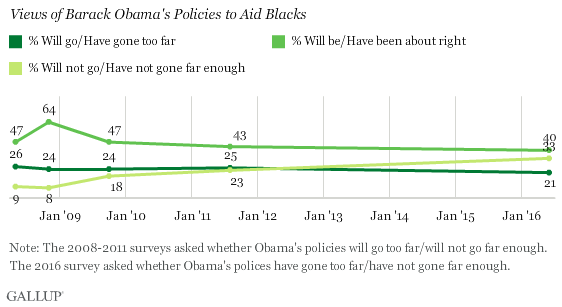
Blacks have never expressed much concern that Obama's policies would go too far in aiding the black community. However, blacks' opinions have shifted from viewing Obama's policies to help blacks as "about right" to "not going far enough." Currently, 52% of blacks say his policies have not gone far enough, up from 20% during the 2008 campaign and 32% his first year in office. The plurality of whites, 39%, still believe his policies have been about right, while 30% say they have not gone far enough. The latter figure is up from 7% during the campaign and 16% his first year in office.
| May 2008 | Oct 2009 | Aug 2011 | Jun 2016 | |||||||||||||||||||||||||||||||||||||||||||||||||||||||||||||||||||||||||||||||||||||||||||||||||
|---|---|---|---|---|---|---|---|---|---|---|---|---|---|---|---|---|---|---|---|---|---|---|---|---|---|---|---|---|---|---|---|---|---|---|---|---|---|---|---|---|---|---|---|---|---|---|---|---|---|---|---|---|---|---|---|---|---|---|---|---|---|---|---|---|---|---|---|---|---|---|---|---|---|---|---|---|---|---|---|---|---|---|---|---|---|---|---|---|---|---|---|---|---|---|---|---|---|---|---|---|
| % | % | % | % | |||||||||||||||||||||||||||||||||||||||||||||||||||||||||||||||||||||||||||||||||||||||||||||||||
| Whites | ||||||||||||||||||||||||||||||||||||||||||||||||||||||||||||||||||||||||||||||||||||||||||||||||||||
| Too far | 27 | 28 | 29 | 25 | ||||||||||||||||||||||||||||||||||||||||||||||||||||||||||||||||||||||||||||||||||||||||||||||||
| About right | 46 | 45 | 42 | 39 | ||||||||||||||||||||||||||||||||||||||||||||||||||||||||||||||||||||||||||||||||||||||||||||||||
| Not far enough | 7 | 16 | 18 | 30 | ||||||||||||||||||||||||||||||||||||||||||||||||||||||||||||||||||||||||||||||||||||||||||||||||
| Blacks | ||||||||||||||||||||||||||||||||||||||||||||||||||||||||||||||||||||||||||||||||||||||||||||||||||||
| Too far | 5 | 5 | 5 | 6 | ||||||||||||||||||||||||||||||||||||||||||||||||||||||||||||||||||||||||||||||||||||||||||||||||
| About right | 64 | 55 | 47 | 39 | ||||||||||||||||||||||||||||||||||||||||||||||||||||||||||||||||||||||||||||||||||||||||||||||||
| Not far enough | 20 | 32 | 43 | 52 | ||||||||||||||||||||||||||||||||||||||||||||||||||||||||||||||||||||||||||||||||||||||||||||||||
| 2008-2011 surveys asked if Obama's policies will go too far/not go far enough; 2016 survey asked if his policies have gone too far/have not gone far enough | ||||||||||||||||||||||||||||||||||||||||||||||||||||||||||||||||||||||||||||||||||||||||||||||||||||
| Gallup | ||||||||||||||||||||||||||||||||||||||||||||||||||||||||||||||||||||||||||||||||||||||||||||||||||||
Implications
Americans had high hopes for what the first black president could accomplish, particularly on matters of race. Obama's early-term job approval ratings were among the highest for a new president, consistent with these expectations. But governing is a challenging task for any president, particularly during a sluggish economy. Since his first year, his job approval rating has struggled to reach or stay above the majority level. Americans' assessments of the effect of Obama's presidency on blacks' lives and on race relations are likely heavily influenced by his general approval ratings.
Americans' expectations for what Obama could accomplish may also have been overly optimistic and perhaps could not have been predicted to persist for eight years after he was elected.
Regardless of how Americans feel about Obama and his policies, they believe black-white relations are much worse now than earlier in his presidency. The public may not necessarily fault Obama for those problems, as roughly half have consistently approved of how he has handled race relations throughout his time in office. But it is clear that the optimism Americans initially had for a black president's ability to improve race relations and the situation for blacks has long since faded.
Historical data are available in Gallup Analytics.
Survey Methods
Results for this Gallup poll are based on telephone interviews conducted June 7-July 1, 2016, with a sample of 3,270 adults, aged 18 and older, living in all 50 U.S. states and the District of Columbia, who had previously been interviewed in the Gallup Daily tracking poll and agreed to be re-interviewed for a later study. The sample is weighted to be representative of U.S. adults.
For results based on the total sample of national adults, the margin of sampling error is ±3 percentage points at the 95% confidence level. For results based on the sample of 1,320 non-Hispanic whites, the margin of sampling error is ±4 percentage points at the 95% confidence level. For results based on the sample of 912 non-Hispanic blacks, the margin of sampling error is ±5 percentage points at the 95% confidence level.
All reported margins of sampling error include computed design effects for weighting.
View survey methodology, complete question responses and trends.
Learn more about how the Gallup Poll Social Series works.
